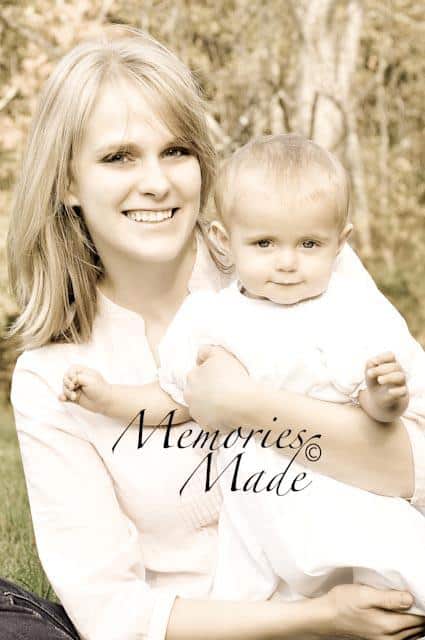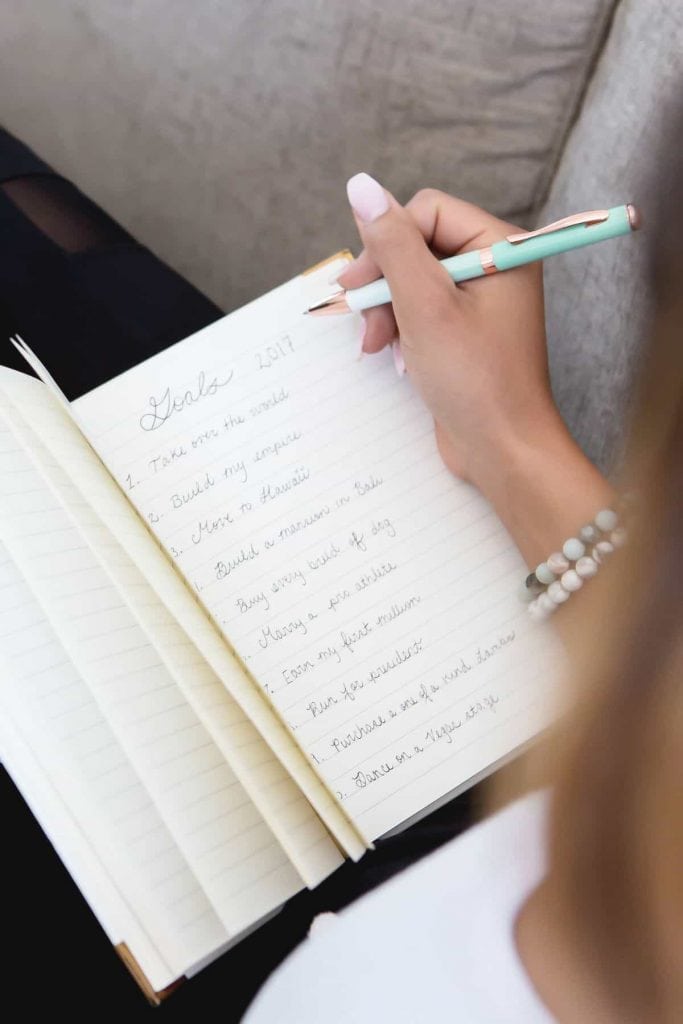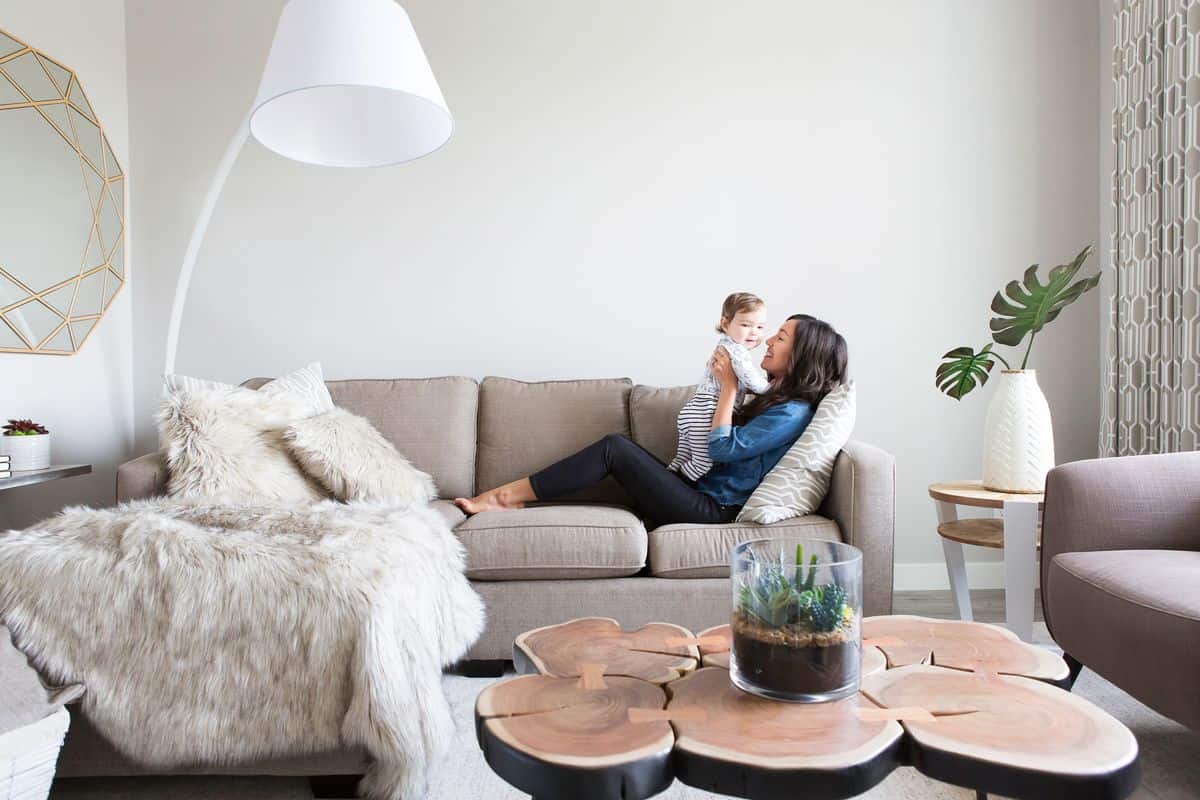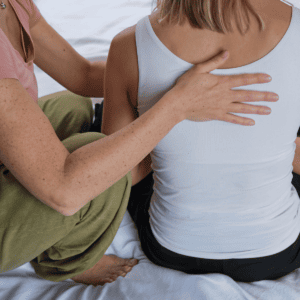Having a baby will kill you and then bring you back again. It will rip every part of you into tiny shreds, so small they’re nearly unidentifiable. It will toss the crinkly little shreds into an abyss that looks much like the world into which your baby was just born: loud, cold, unfamiliar, wide open. For me, it felt like an identity crisis immediately after baby. Putting those shredded pieces back together is the process of rediscovering yourself after motherhood.
It’s my experience that many new moms experience this identity crisis after baby, yet very few know what to do about it. Having a newborn is damn hard work. To hear more about the postpartum process, check out these articles:
- “Dear Everyone, Let’s Be Honest About Postpartum Recovery”
- “Why We Really Need to Talk About Postpartum Anxiety”
- “Postpartum Body: What No One Tells You”
So seriously, how are we supposed to care to a tiny human AND to do the hard work of rediscovering ourselves after motherhood? It sounds impossible, I know. But it’s also imperative.
In this article, I’ll tell my story of rediscovering myself after having Jack, including signs for recognizing your slipping identity, as well as specific tips for rediscovering yourself.

This site contains affiliate links, meaning that we earn a small commission for purchases made through our site. We only recommend products we personally use, love, or have thoroughly vetted.
- Why Do Moms Lose Their Identity?
- Rediscovering Yourself Physiologically
- Rediscovering Yourself After Motherhood Is Important for All Moms
- The Guilt of an Identity Crisis After Baby
- Rediscover Yourself Consciously
- What Happens If We Lose Ourselves in Motherhood?
- Signs You’ve Lost Yourself In the Identity Crisis After Baby
- How Do I Not Lose Myself in Motherhood?
- Tips for Rediscovering Yourself After Motherhood
- Rediscovering Yourself After Motherhood Make the World Better
Why Do Moms Lose Their Identity?
Let me start by saying that not all moms do, and to them, bravo. But the rest of us need to understand what’s causing our worlds to turn upside down.
Jack’s birth felt like both a death and birth: my past self’s death, his birth, and the beginning of a personal rebirth I would have to intentionally foster for years to come.
My baby had lurched from my dark, warm, safe womb into a starkly bright, cold world. Metaphorically, so had I.
I died a little the day Jack was born. How could I not? Whether or not you recognize it consciously at the time, your mind must go through a rapid and intense adjustment, which partly involves the death of your old self.
To be clear, what I’m talking about is not dark or morbid or scary; it’s merely essential.
I believe our coping mechanism is that, when we first have the responsibility of another human in our care, our old selves die, and a new self is reborn.
Rediscovering The World Around You
And just like a newborn has to learn the world around her, discovering how to suck, eat, walk, talk, socialize, relate, so must we rediscover these things for ourselves. We must relearn how to understand our own self identities.
We have to rediscover how to use our time. How to survive having so little control. How to remake ourselves into a new version, the version of “mom,” while also holding on to our past selves and lives.
The moment your child is born, your life is forever changed. If you carried your own child, then your body has long been forever different. But now, it begins its recovery. It’s going back to a “normal” state, but it’s a very new normal. You will, in fact, never again be the person you once were. At least I won’t.
After the loss of 4 pregnancies (read that story in “Recurrent Miscarriage: What it was Like Surviving the Darkness”), I was a changed person.
I had dreamt of Jack’s birth, spent years working toward it, and I felt like I’d been punched in the gut when it didn’t bring intense joy and ONLY intense joy.
This is a struggle women with fraught fertility journeys face. We feel guilty when we feel the struggle of the baby we finally have, knowing how many people are still longing for that baby. I have no evidence to prove this, but I think this can make the identity crisis even harder.
Rediscovering Yourself Physiologically
One of the reasons new moms often struggle with identity shift is that they have actually gone through major physiological and neurological changes (some of which occur among adoptive mothers and families who used gestational carriers, as well.)
The physiological changes a woman’s body goes through during pregnancy and the postpartum period are astonishing. They are also much longer lasting than the timeframe they might, on the surface, seem to span. And the postpartum changes are, in many ways, equally or more intense.
For one thing, a woman’s brain chemistry is altered after giving birth: for years, decades, and possibly life.
For super accessible explanations of some of this madness, check out one of these short articles:
- “Moms: Your Kids Hijacked Your Brains for Life” in Wired
- “Baby’s Cells Can Manipulate Mom’s Body for Decades” from Smithsonian Magazine.)
For more detailed reading, sit down with Angela Garbes’s recent book, Like a Mother: A Feminist Journey through the Science and Culture of Pregnancy. There’s a Kindle and Audible version for the car, and it’s a really great read for moms who are struggling to feel excited about their pregnancy or new role as a mom!

Garbes, much like me, is a bit of a research junkie, and we’ve both spent tons of time delving into research about women’s reproductive bodies. I’ll use her words here:
“The cells of our children, whether we carry them to term or not, live in our bodies for a lifetime.”
Angela Garbes
In other words, the moment a woman conceives a pregnancy, she is forever changed. Not because she has some sudden maternal instinct that makes her selfless and angelic. Let’s stop kidding ourselves about that, please.
But because she has the cells of another living being inside of her, and she always will.
Rediscovering Yourself After Motherhood Is Important for All Moms
Since we’re all about inclusivity here at Undefining Motherhood, let me be clear about one thing. When pregnancy and childbirth aren’t at play, the psychological struggles of new parenthood are still enormous.
When you’ve been through the emotional and financial turmoil of adoption or surrogacy, your stress levels have likely been exceedingly high. With cortisol levels constantly through the roof, how could our bodies and minds not shift?
Or take even more sudden, unexpected examples.
Perhaps you were granted custody of (a) child(ren) following the loss of a loved one. Or maybe you now have custody of a child whose parents are living but are unable to care for them.
The former situation brings with it a combination of shock and grief. The latter entails not just the new responsibility for human life, but also the baggage of the biological parents of the children you’re raising.
The point is, every scenario by which I can imagine a parent coming to have a child involves extreme emotions and a major shock to the system. Your body may not be carrying new cells, but your chemistry has shifted.
Your life will absolutely never be the same. The identity shift that occurs the moment you become responsible for another life is an incredibly intense experience. And with it, in many ways, necessarily comes a sense of loss.
It’s a loss of the former self. It requires a reconfiguration of your own self-identity. It’s essential that we experience this reconfiguration, this rediscovery of ourselves after motherhood, consciously and intentionally. Otherwise, we risk losing ourselves among the identity shift chaos.
The Guilt of an Identity Crisis After Baby
I would argue that one of the main reasons we feel guilty for needing to rediscover ourselves after motherhood is because we’re socialized to believe that we should become mothers. Not just that, but we should become selfless, angelic, joy-filled mothers who dote over our newborns and sacrifice ourselves for them.
Historically, Anglo-American cultures have depicted mothers as either angelic, selfless beings, or demons who refuse to live up to their angelic potential. I’ll use Garbes’s words again here:
“In American culture, motherhood is inextricably tied to the language of morality. Over and over, the message reinforced to expecting mothers is that there’s a ‘right’ and a ‘wrong’ way to do things . . . This cultural standard is so well established that we even joke about it, proudly proclaiming ourselves ‘bad moms’ when we stray from these expectations.”
Angela Garbes
Amen, sister.
Here’s the thing. Mothers aren’t selfless because they’re born with an instinct that allows them to be; they become less selfish when they have a child because they have no other choice.
Because if they don’t choose to put their child first, who will?
But also, in some ways, mothers become more selfish. And I, personally, think that’s a good thing. Because personal time is gold. Because they can’t just go and do whenever they want, and that can breed resentment.
Ask my friends if I’m as giving of my time and energy as I was before having Jack–I dare you to find one who pretends I am. And I’m a working mom with a great support system and plenty of help. So this is even more true for single moms, parents working multiple jobs, parents who don’t live near family or who don’t have helpful family, etc.
Let’s not sugarcoat it. Being a parent is hard, time consuming, and exhausting, no matter what your circumstances. And while my friends would likely say I’m more selfish with my time than I was before, many will also say that they still see me, or hear from me, without Jack in the background or at the dinner table.
Why be so conscious to make this time? (Which, yes, I realize it’s a privilege to have the ability to create.) Making time for yourself is an integral part of rediscovering yourself after motherhood.

Rediscover Yourself Consciously
If we put our children entirely first, there’s much we risk losing. Our interests, our relationships, and eventually, ourselves. It is for this reason that I insist that we must experience our own rebuilding of self identity consciously and intentionally.
I’ve said since I was 7-years-old that I wanted to be a writer. It wasn’t until after Jack was born that I chose to pursue writing full-time. It was a risk I needed to take to feel more myself, but also to find my new self.
Who was I now that I had a human I was responsible for? I may be a mom, but damn it, I would also be a writer. I had always said I would be one, but I never really did it. The same goes for motherhood.
It was time to allow my new self to feel whole, to finally do the thing my former self had always said it wanted to do.
Becoming a writer was a conscious choice as part of the rediscovery of myself after motherhood. It was also a privilege, a huge privilege, and I’m abundantly thankful for the opportunity. Please don’t think I’m unaware of that.
Even when you don’t have such choices available to you, you make choices every day, nearly every moment. Making those choices consciously allows you to find the balance between loving yourself and doing right by yourself, and always making sure your children are loved and well cared for.
Without conscious decision-making, without conscious self-discovery, we often default to selfless mom-mode.
We do this because that’s what we’ve been socially trained to believe we should do. And because we just have to survive.
What Happens If We Lose Ourselves in Motherhood?
When my best friend Tessa had her first child, she lived far away from all family, and her husband was a busy medical resident. She chose to leave her job as a librarian because it would be easier to get by on her husband’s resident salary than to work and pay for childcare.
When family came to visit, she and her husband would have an occasional date night. But with his busy, inflexible resident schedule and the fact that Tessa exclusively breastfed, she often just enjoyed the extra set of hands. Her precious baby girl did not have a babysitter who wasn’t a family member (or me) a single night of her infancy.
Having a sitter at all was rare because of geographical constraints. For well over a year, Tessa took this baby everywhere. They were a pair. If her friends wanted a girl’s dinner, they knew baby would be in tow. What else was there to do? Tessa loved it, but she also had no other choice.
I remember her once remarking that she felt like she was dumber since having a kid. “If it doesn’t have to do with breastfeeding or sleeping methods or babywearing, I don’t even know how to talk about it.”
She actually wasn’t complaining, but she was right.
She was not the same friend I’d fallen in love with in college and remained in love with ever since.
I still loved her, but in some ways, I barely knew her. Because our lives were so far apart. I didn’t want kids yet, and she truly couldn’t talk about anything else.
It was a chaotic time when her first baby was born. With her husband in his last year of residency and on a geographically broad job hunt, they also had a move to plan.
Among this chaos, Tessa did not had the opportunity to be conscious in her own self-discovery.
She was a stay-at-home mom with limited resources and a busy partner with zero control over his schedule. He was in a prestigious job, sure, but one that paid very little and required very much.
So for years, she lost herself to motherhood. She wouldn’t change it, but she also wouldn’t change the fact that she did, eventually, rediscover herself after motherhood.

Signs You’ve Lost Yourself In the Identity Crisis After Baby
(1) Your child is the only person in your life.
I don’t mean this exactly literally, but kind of.
Imagine yourself in a room of mirrors, and every person in your life has a mirror reflecting back on you. Before Jack, I had so many mirrors, so many relationships to foster. I still have a lot of mirrors, but for a while, they decreased.
If you can’t see the people in the mirror–if you aren’t talking to them, seeing them, giving to them and not just asking of them, then it’s not a good reflection.
If you see mostly bad reflections, you may be losing yourself in motherhood.
(2) Your feelings toward your physical appearance change.
Moms often ask, “How can I feel beautiful again after having a baby?” I ask in return, “Do you put the same time into your beauty routine?”
For some of us (me), that means only makeup for certain occasions, wavy hair, and yoga clothes.
But for the mom who was always put together to the nines before having a baby, it’s a big sense of loss to lose that. You may not have time for it, but find small ways to work in a beauty routine. You’ll feel more like yourself already.
(3) You can’t talk about anything other than your baby.
It’s true that we all love to talk about our kids, but we also need other things in our lives.
What we talk about is a good indicator of what we’re thinking about and what we’re putting our time into.
If you can only talk about your kid, that’s likely where you’re putting all your energy.
I get it–there’s only so much energy to go around–but you deserve some for your own life, mama.
How Do I Not Lose Myself in Motherhood?
When Tessa had her second child, a darling son, her situation looked much different.
Her husband was in a full-time position in a hospital, they were settled into a long-term home, and they lived within 3 hours of multiple family members.
This time, they also had enough disposable income that she could afford things like mother’s morning out programs or babysitters. This is when I saw her rediscover herself after motherhood.
I recognize that this directly connects both time and money to rediscovering yourself. Mamas who have close friends or family nearby are also privileged to be able to have someone they trust to leave a newborn with. However, without the means of time to yourself, rediscovering yourself after motherhood is harder to accomplish–not impossible, mind you, but harder.
With the ability to socialize more, Tessa sought girlfriends and friends for her children, but not girlfriends because they were friends with her children. She found people who brought her joy, and their children learned to love each other because of the bonds between their moms.
She picked up a part-time job, did tons of volunteer work, became politically active. Now she works in the library at her children’s school, organizes community events, has a flourishing network of people whose lives she enriches. Her children look up to their mom who does so many good things for herself, for them, and for their community.
What her children see everyday is a strong female role model who loves them fiercely and fights to make the world better for them. They’re better children for it, and they’ll be better adults for it.
Tips for Rediscovering Yourself After Motherhood
- Practice self care. It’s not always a privilege, as there are tons of free ways to do it with little time. A shower is self care, friend. Read more about that in “Self Care for Moms: Why Self Care is Important and Powerful.” And of course, download our 10 Tips for FREE Self Care!
- Find a hobby. Into reading? Want to learn to paint or knit? Finding a hobby can be a great way to spend introspective, fun time with yourself while your kid naps, or is with a sitter.
- Develop social hobbies. Take a painting class with a friend. Schedule walks in a park. Heck, you can do this with a stroller, but you’ll find yourself talking about your actual life and fostering relationships you need to foster.
- Get outside. Sun gives you Vitamin D, which you need for energy and happiness. You can’t rediscover yourself without the mental clarity that comes from this. Again, you can take your kid with you if needed. It will still help!
- Journal. Write in a journal a few times a week. Even journaling for 5 minutes a day, 3 days a week will allow you to be introspective. Reading your journal entries will also give you good insight into your mental state.
- Date nights and/or girl’s nights. You need time away from your child that isn’t spent at work. Period. If you can possibly put these nights together, do it. Save some money each week and have your mom or a trusted friend keep your kid. Need an actual sitter? Download the Bambino app and use code KATY2019 for $10 off your first sitter!

Rediscovering Yourself After Motherhood Make the World Better
One thing Tessa’s story suggests is that the ability to be rediscover yourself after motherhood is, in part, a product of privilege. When you’re in survival mode, you rely mostly on instinct, almost never on contemplative thought.
But what her life also shows is that small conscious decisions toward selfcare lead to more and bigger ones. No matter our circumstances, we can all make the small ones.
And I hope we do make the small ones every chance we get.
If we don’t, we risk our former selves dying and our mother selves getting lost in our children. Simultaneously, if we refuse to recognize what we’ve lost in all that we’ve gained through motherhood–if we refuse to change our way of life after we have children–we risk raising children who don’t feel loved or secure. Self-discovery helps us find the balance.
Children need to experience love and support. They also need to see more powerful women doing what makes them happy.
Maybe what makes you happy is being with your children all the time and centering your world around them. Good for you, mama. But that ain’t me. It’s not most of us.
By finding ways to overcome the identity crisis after baby, we can give children both. We can show them the place in between. I believe that place will create a better world.
The Place In Between
There’s a place in the middle. A place where our children know how loved and secure they are, but where they also see models of strength, independence, and self-understanding.
This place, I believe, begins the moment our former selves die, and can only be rebuilt carefully and consciously as we go through our new infancy as mothers.
If we’re careful enough, we can create much better versions of ourselves, which will allow us to raise children who will be much better citizens of our world.
I’m thankful Jack gets to see what it looks like to have a strong mama who rediscovered herself after motherhood.
Did you experience an identity crisis after baby? Tell us about it in the comments!









I have a 14 month old and lately I’ve been thinking a lot about these narratives of transformation around motherhood. Pregnancy and birth, are, of course, biologically transformative processes, and I do think that being a mother will change me in some ways, just as, say, going to graduate school or being with the same partner for a decade have changed me in some ways. When the conditions of your life change, so do you.
But have I found motherhood transformative? No.
I had a traumatic delivery — that was transformative in the sense that I had never felt truly, terribly mortal before. Now I do, and it is terrifying.
But motherhood has not felt transformative. I’m still the same person I was before – just a tireder version of her. I’m still interested in the same things. I still want the same things. I still have the same needs. I even (I’m thankful for this, because I am really vain) have basically the same body, save a c section scar and I guess some of my son’s DNA floating in my blood. Having a child feels less like a radical shift in my life’s orientation and more like taking on a second job, one that I have to manage carefully so I can keep living a whole person’s life.
Why do we use language around transformation and not language around management to describe how women adapt to being mothers? Are mothers really profoundly different people than they were before they had a child?
This is such a great response, and it makes me ready for Jack to go to sleep so I can re-read my post and take a close look at my rhetoric. I actually hadn’t thought of myself as saying that motherhood was transformative, although I definitely do think I say that, especially with some of my photo choices.
What I was actually trying to do was work through understanding the sense of loss I felt after having a child, and how I am wrapping my mind around working through that. Having 4 miscarriages before having a living baby, I felt SO much guilt about the postpartum depression and anxiety I experienced. I felt like I had truly lost something of myself, but then terribly guilty for feeling that way. Of course, I do feel like I’ve gained a lot, but my ideas in the post were really trying to work through how I got from one point to another.
I actually have a similar issue with narratives of transformation, not only for the good reasons you outline in your questions, but also because they suggest some sort of completion, as if you can’t be complete or evolved unless you have a child. Thank you for making me question my writing and rhetoric. That’s so important, and so much of what this space is about!
It sounds like we’re using different language to describe similar kinds of feelings and processes. I had a different experience with pregnancy (I have never had a miscarriage, as far as I know, and am so sorry that you had to have that experience), and I felt very ambivalent about having a baby. But I’ve found the adjustment to being a parent really hard too, mostly because that ambivalence didn’t go away. My kid is an awesome human being, and I am so happy that he’s in my life. But I don’t love being a parent, or, especially, a “mother”.
I think those feelings underpin my resistance to representations of becoming-motherhood as a process of rebirth or transformation. They imply the death of who I was, in a way that doesn’t feel authentic to me or remotely desirable. Being a mother isn’t something I am, it’s something I do (sometimes joyfully, sometimes reluctantly). Or, at least, thinking about it that way has made the adjustment to parenthood easier for me because it makes my feelings ok.
I think maybe there are also some gender issues at play here. Are men reborn when they become fathers?
Ah! We’re definitely playing a language game here. I use the word “death” to describe a true sense of loss I felt after I had my son. Which was a really hard feeling to deal with since I had worked so hard for him and knew how desperately
I had wanted him. I also knew there were so many women out there with the burning desire for a child but no luck, so the guilt of feeling that loss overtook me, and I had severe struggles with postpartum anxiety and depression. I had to find a way to reconcile the sense of loss I felt with the joy my child brought me. How could I possibly be so happy and yet so unhappy at the same time? To me, the death of the former self gives me a way to
Cope with that chasm. It lets me place the sense of loss in a real place, and the idea of conscious rebirth allows me to pull what I want back from my pre-baby life, while filling in things I don’t want with newness that involves my son. It allows me to make space for both.
I’ve actually been asking myself a lot about whether this is something men go through, and I don’t have a good answer. Honestly, I think the answer is yes – I remember watching my husband deal with the paradigm shift and trying to wrap his head around how different our daily lives looked before and after baby. But without the social pressure to be the selfless caregivers (F that, by the way), and without all the added hormones and bodily trauma, it seems like this reconfiguration must surely be less for men. I just don’t know, but I’d love to hear people’s thoughts as I try to work my way through this.